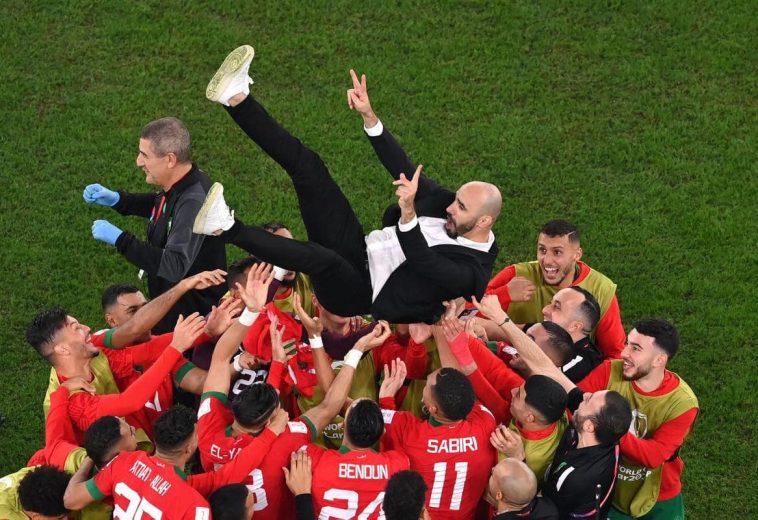After South Africa hosted the FIFA World Cup in 2010, the beautiful game is coming home again, this time through the shores of North Africa, particularly in Morrocco. Here are nine cogent steps taken to give hope to the coming of the round leather game to Africa.
On a memorable day, recently in October, the FIFA Council revealed the hosts for the much-anticipated 2030 World Cup: Morocco, Spain, and Portugal. This groundbreaking decision, commemorating the tournament’s centenary, also granted Uruguay, Argentina, and Paraguay the honour of hosting three matches each in their capital cities. This pivotal move signifies a historic juncture as the World Cup will span six countries across three continents, a first in its celebrated history.
Morocco, buoyed by its successful campaign in the 2022 Qatar World Cup, stands ready to script yet another illustrious chapter in its footballing narrative. Remarkably, Morocco made history in the previous World Cup by becoming the first African nation to reach the semi-finals, solidifying its place among football’s elite. Now, it proudly joins the ranks of African host nations, following in the footsteps of South Africa’s successful hosting in 2010. This unique opportunity will see 48 teams compete across 104 matches, vying for the coveted World Cup trophy.
Securing this honour was no easy task for Morocco, having bid for the World Cup on five previous occasions, narrowly missing out on the opportunity each time. However, this time, Morocco’s persistence paid off, capturing the spotlight as a nation with unwavering football zeal and determination.
Beyond the significance of this momentous occasion, the Confederation of African Football’s support further underscores Morocco’s capabilities. Granting Moroccothe rights to host the Africa Cup of Nations in 2025, the Confederation’s decision exemplifies confidence in Morocco’s infrastructure and organisational prowess, especially after Guinea faced challenges related to security and infrastructure.
Before the seismic events of September 2023, Morocco boasted commendable infrastructure. The nation featured six stadiums with substantial capacities, along with additional venues to accommodate enthusiastic fans. With 18 international standard airports and 16 facilitating international travel, Morocco showcased a robust transportation network, ranking favourably in infrastructure availability and capability, according to the World Economic Forum.
Morocco’s footballing odyssey commenced in 1970 at the FIFA World Cup in Mexico. While the journey had its highs and lows, including a notable feat in 1986 when the Atlas Lions topped their group, Morocco has consistently contributed to the global football landscape. Recent tournaments have seen the nation’s resurgence, culminating in semi-final appearances and leaving an indelible mark on the world stage.
However, the 2030 World Cup announcement hasn’t been devoid of concerns. Some express worries about the logistical complexities and extensive travel distances for teams. Former Mexican team manager Javier Aguirre voiced his concerns, highlighting the challenges faced by teams due to the tournament’s multi-country format.
Environmental and sustainability concerns have also emerged, with critics questioning the higher carbon footprint due to increased flights across continents. This has led to scrutiny of FIFA’s commitment to environmental responsibility and sustainability in organising such a grand-scale event.
Former football personalities like José Luis Chilavert expressed differing opinions, advocating for a South American host and voicing concerns about the decision’s suitability. As discussions ensue and the FIFA Council awaits ratification of the bids, considerations surrounding sustainability, legacy, and environmental impact will play pivotal roles in shaping the future of global football extravaganzas.
As the world awaits the FIFA Council’s decision, Morocco’s Casablanca and the capitals of Spain and Portugal gear up for what promises to be a monumental event in 2030. Football enthusiasts eagerly anticipate this global celebration, poised to witness the beautiful game showcased on a grand scale across continents.
The FIFA World Cup 2030 will not only be a celebration of football excellence but also a testament to unity, diversity, and the enduring spirit of the game, fostering connections that transcend borders and cultures.


